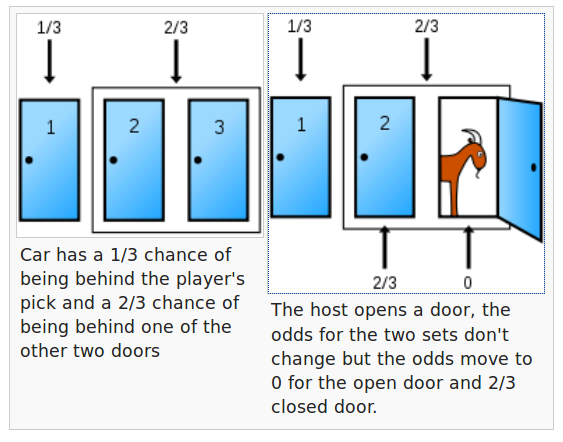Algorithms - Monty Hall Paradox
bogotobogo.com site search:
Monty Hall Paradox
Since there are numerous descriptions on Monty Hall Problem, I do not want to make another one here.
Actually, I'm not convinced by the explanations/arguments to this day. However, after seeing the simulations, I finally realized we need to switch the door to increase the odds of winning the prize.

Picture from Monty Hall problem - wiki
Monty Hall Paradox in Python
#!/usr/bin/python2
import random
class MontyHall:
def __init__(self):
self.prize_door = random.randint(1,3)
self.selected_door = 0
self.opened_door = 0
def select_door(self):
self.selected_door = random.randint(1,3)
def host_door(self):
# host door should not be the selected nor prize door
d = random.randint(1,3)
while d == self.selected_door or d == self.prize_door:
d = random.randint(1,3)
self.opened_door = d
def switch_door(self):
# sum of door numbers = 1+2+3 = 6.
self.selected_door = 6 - self.selected_door - self.opened_door
def hit(self):
if self.selected_door == self.prize_door:
return True
def run(self, switch=True):
self.select_door()
self.host_door()
if switch:
self.switch_door()
return self.hit() # hit?
# Switch
RUNS = 10000
print "%s Monty runs" %(RUNS)
hits = 0
for i in range(RUNS):
monty = MontyHall()
if monty.run(switch=True):
hits += 1
print "Switch : %.1f%%" %(100.*hits/RUNS)
# Stay
hits = 0
for i in range(RUNS):
monty = MontyHall()
if monty.run(switch=False):
hits += 1
print "Stay : %.1f%%" %(100.*hits/RUNS)
Run:
10000 Monty runs Switch : 66.3% Stay : 33.5%
Ph.D. / Golden Gate Ave, San Francisco / Seoul National Univ / Carnegie Mellon / UC Berkeley / DevOps / Deep Learning / Visualization